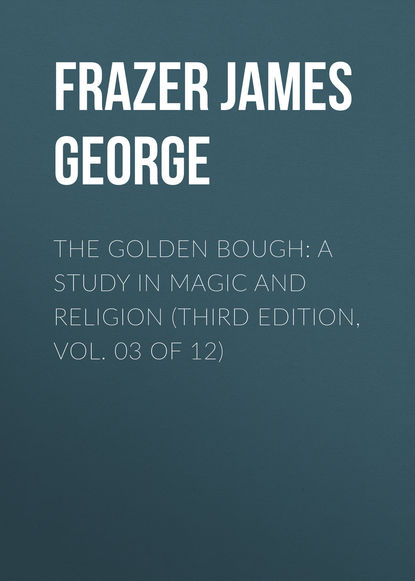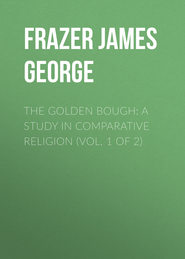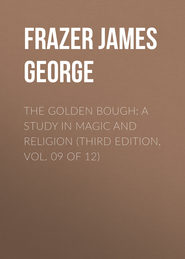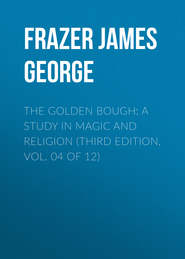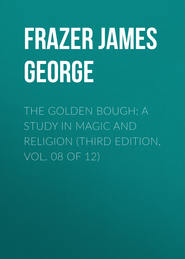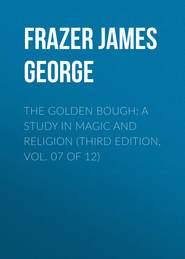По всем вопросам обращайтесь на: info@litportal.ru
(©) 2003-2024.
✖
The Golden Bough: A Study in Magic and Religion (Third Edition, Vol. 03 of 12)
Настройки чтения
Размер шрифта
Высота строк
Поля
1183
H. A. Oldfield, Sketches from Nipal (London, 1880), ii. 342 sq.
1184
Arrian, Anabasis, ii. 3; Quintus Curtius, iii. 1; Justin, xi. 7; Schol. on Euripides, Hippolytus, 671.
1185
Public talismans, on which the safety of the state was supposed to depend, were common in antiquity. See C. A. Lobeck, Aglaophamus, pp. 278 sqq., and my note on Pausanias, viii. 47. 5.
1186
On the primitive conception of the relation of names to persons and things, see E. B. Tylor, Early History of Mankind,
pp. 123 sqq.; R. Andree, Ethnographische Parallelen und Vergleiche (Stuttgart, 1878), pp. 165 sqq.; E. Clodd, Tom-tit-tot (London, 1898), pp. 53 sqq., 79 sqq. In what follows I have used with advantage the works of all these writers.
1187
J. Mooney, “Sacred Formulas of the Cherokees,” Seventh Annual Report of the Bureau of Ethnology (Washington, 1891), p. 343.
1188
E. W. Nelson, “The Eskimo about Bering Strait,” Eighteenth Annual Report of the Bureau of American Ethnology, part i. (Washington, 1899) p. 289.
1189
A. C. Kruijt, “Van Paloppo naar Posso,” Mededeelingen van wege het Nederlandsche Zendelinggenootschap, xlii. (1898) pp. 61 sq.
1190
Professor (Sir) J. Rhys, “Welsh Fairies,” The Nineteenth Century, xxx. (July-December 1891) pp. 566 sq.
1191
A. W. Howitt, Native Tribes of South-East Australia, p. 377; compare id. p. 440.
1192
R. Brough Smyth, Aborigines of Victoria, i. 469, note.
1193
C. Lumholtz, Among Cannibals (London, 1889), p. 280.
1194
A. W. Howitt, op. cit. p. 736.
1195
A. W. Howitt, op. cit. p. 133.
1196
E. M. Curr, The Australian Race, i. 46.
1197
J. Bulmer, in Brough Smyth's Aborigines of Victoria, ii. 94. The writer appears to mean that the natives feared they would die if any one, or at any rate, an enemy, learned their real names.
1198
Spencer and Gillen, Native Tribes of Central Australia, p. 139; compare ibid. p. 637; id., Northern Tribes of Central Australia, pp. 584 sq.
1199
E. Lefébure, “La Vertu et la vie du nom en Égypte,” Mélusine, viii. (1897) coll. 226 sq.
1200
Mansfield Parkyns, Life in Abyssinia (London, 1868), pp. 301 sq.
1201
Grihya Sûtras, translated by H. Oldenberg, part i. pp. 50, 183, 395, part ii. pp. 55, 215, 281; A. Hillebrandt, Vedische Opfer und Zauber, pp. 46, 170 sq.; W. Caland, Altindisches Zauberritual, p. 162, note
; D. C. J. Ibbetson, Outlines of Punjáb Ethnography (Calcutta, 1883), p. 118; W. Crooke, Popular Religion and Folklore of Northern India (Westminster, 1896), i. 24, ii. 5; id., Natives of Northern India (London, 1907), p. 199.
1202
A. B. Ellis, The Tshi-speaking Peoples of the Gold Coast, p. 109.
1203
A. B. Ellis, The Ewe-speaking Peoples of the Slave Coast, p. 98.
1204
L. J. B. Bérenger-Féraud, Les Peuples de la Sénégambie (Paris, 1879), p. 28.
1205
E. Modigliani, Un Viaggio a Nías (Milan, 1890), p. 465.
1206
T. C. Hodson, “The genna amongst the Tribes of Assam,” Journal of the Anthropological Institute, xxxvi. (1906) p. 97.





